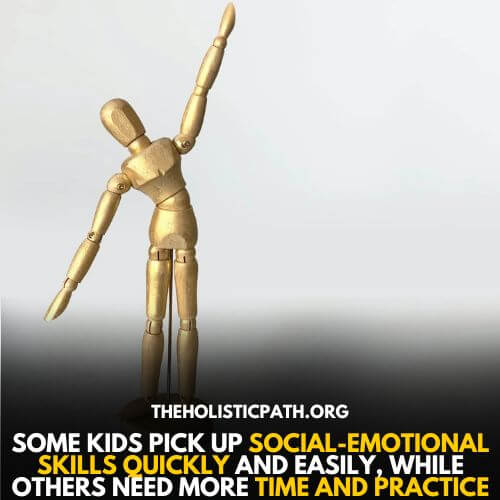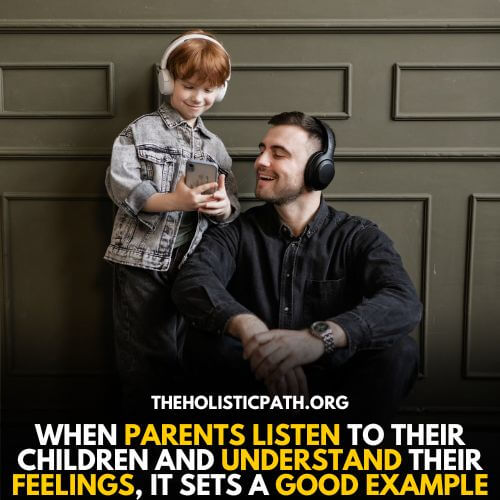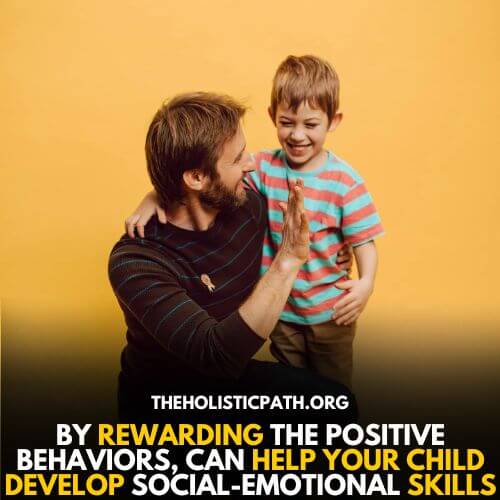Social-emotional skills list is a great way to start developing social and emotional intelligence. The list includes skills such as self-awareness, self-management, social awareness, relationship management, and responsible decision-making.
These skills are essential for success in school, work, and life. While some people may be born with a natural aptitude for social and emotional intelligence, everyone can benefit from developing these skills. The good news is that social-emotional skills can be learned at any age.
So whether you’re just starting out on your journey of self-discovery or you’re well on your way to becoming a social and emotional superstar, check out this social-emotional skills list to see where you can improve.
What Are Social-Emotional Skills: 10 Advantages That Make Them Important
Social-emotional skills are the skills that we use to interact with other people. This includes things like being able to communicate effectively, being able to understand and empathize with others, and being able to resolve conflict.
These skills are important because they help us to build and maintain social relationships. They also help us to cope with stress and to make better decisions. Without social-emotional skills, we would have a much harder time navigating the social world.
Social-emotional skills don’t just benefit individuals – they also benefit families, businesses, schools, and society as a whole. When we all have strong social-emotional skills, we can create a world that is more cohesive, compassionate, and successful.
Some of the reasons that make social-emotional skills an important part of our daily life:
- Social-emotional skills help us to understand and regulate our own emotions.
- Social-emotional skills help us to understand and regulate the emotions of others.
- Social-emotional skills help us to build relationships and communicate effectively with others.
- Social-emotional skills help us to problem solve and negotiate conflicts constructively.
- Social-emotional skills help us to manage stress and stay calm in difficult situations.
- Social-emotional skills help us to be more self-aware and aware of others in social situations.
- Social-emotional skills help us to be more compassionate and understanding of others.
- Social-emotional skills help us to be more resilient and adaptable in the face of adversity.
- Social-emotional skills are essential life skills that we need for overall well-being and success in life.
- Social-emotional skills are important for problem-solving.
When Do Social Emotional Skills Start To Develop
Social-emotional skills start to develop in early childhood and continue to develop throughout adolescence and adulthood. These skills include the ability to regulate emotions, establish and maintain positive relationships, and cope with stress and adversity.
Research has shown that social-emotional skills are linked to a range of outcomes, including academic success, mental and physical health, and overall life satisfaction. Many factors contribute to the development of social-emotional skills, including genetics, temperament, parenting style, and environment.
While social-emotional skills can be developed at any age, early intervention is often the most effective. Therefore, it is important to provide children with opportunities to practice these skills from an early age.
Early Intervention Is Best For Developing Social-Emotional Skills
Early intervention is important for social-emotional development for a few reasons. First, social-emotional skills begin developing in the earliest years of life.
If intervention begins early on, it can help to nurture and support the skills as they develop.
Second, early intervention can help to prevent social-emotional difficulties from becoming more entrenched later on in life. If difficulties are identified early and addressed effectively, they are less likely to cause long-term problems.
Finally, early intervention can be more effective and less costly than an intervention that takes place later in life. By starting earlier, we can avoid some of the tremendous costs associated with social-emotional difficulties.
Here are just a few reasons why early intervention is so important:
- Social-emotional skills are linked to success in school and in later life. Kids who have strong social-emotional skills are more likely to do well in school and have successful careers.
- Early intervention can prevent social-emotional difficulties from getting worse. If social-emotional skills are not developed early on, problems can become more pronounced and difficult to treat later on.
- Social-emotional skills provide a foundation for other areas of development. Strong social-emotional skills help kids to develop other important skills, such as communication, problem-solving, and self-regulation.
Early intervention is essential for helping kids to develop strong social-emotional skills. By getting help early on, kids can develop the skills they need to succeed in school and in life.
Developing Social-Emotional Skills: How Long Does It Take
Social-emotional skills are the ability to manage emotions, set and achieve goals, feel empathy for others, establish and maintain relationships, and cope with stress and adversity. These skills don’t develop overnight—it takes time and experience to learn how to navigate the social world.
Different social-emotional skills emerge at different ages, but there’s no hard-and-fast rule for when they should be mastered. Some kids pick up social-emotional skills quickly and easily, while others need more time and practice.
One way to think about social-emotional skills is as a continuum: at one end are the basic skills that all people need in order to get along in the world, such as being able to control emotions and regulate behavior.
As you move along the continuum, the skills become more complex—for example, being able to set goals and work toward them, or being able to empathize with others and resolve conflicts. Ultimately, the goal is to reach the highest level of social-emotional functioning, which includes being resilient in the face of stress and setbacks.
There’s no one right way to develop social-emotional skills.

Some kids naturally pick up these skills through everyday experiences, while others may benefit from more intentional teaching and practice. Most kids will need a mix of both. The important thing is to create opportunities for kids to learn and practice social-emotional skills in a supportive environment.
When kids feel safe, they’re more likely to take risks and try new things—which is essential for social-emotional learning. Here are some tips for building social-emotional skills:
Encourage lots of talking: Talking about feelings can be tough for kids (and adults!). But it’s an important way to help kids understand and express emotions. So encourage your child to talk about how he or she is feeling—what makes him happy, what makes him sad, what makes him angry? Don’t force your child to share if he’s not ready, but let him know that you’re always available to talk when he is.
Model social-emotional skills: Kids learn by watching adults around them. So it’s important to model the social-emotional skills you want your child to learn. For example, if you want your child to learn how to cope with frustration, model calm problem-solving yourself when you’re faced with a challenging situation. If you want your child to learn empathy, take care to listen mindfully when he talks about his experiences—really try to understand how he must be feeling.
Provide opportunities for practice: Social-emotional learning doesn’t happen in a vacuum—it requires practice! So make sure your child has opportunities to put his newly acquired skills into action. For example, if he’s learning how to deal with anger management issues, provide opportunities for him to cool down after he gets upset (e.g., by going for a walk or writing in a journal). If she’s working on goal setting, help her identify a realistic goal she can work toward (e.g., saving up for a new toy). And if he’s working on building friendships, look for opportunities to connect him with other kids who share his interests (e.g., through a sports team or club).
Social-Emotional Skills List: 52 Skills That You Can Learn
There are a variety of social-emotional skills that are important in life. Here are just a few:
- Resilience
- Emotional intelligence
- Problem-solving
- Critical thinking
- Creativity
- Flexibility
- Persistence
- Curiosity
- Open-mindedness
- Optimism
- Self-awareness
- Self-regulation
- Social awareness
- Relationship skills
- Communication skills
- Conflict resolution skills
- Cooperation skills
- Empathy
- Sympathy
- Respectfulness
- Honesty
- Integrity
- Generosity
- Kindness
- Compassion
- Forgiveness
- Patience
- Optimism
- Humor
- Gratitude
- Appreciation
- Positivity
- Zest
- Enthusiasm
- Confidence
- Assertiveness
- Independence
- Self-reliance
- Leadership
- Goal setting
- Planning and organizing
- Time management
- Decision making
- Critical thinking
- Resourcefulness
- Persistence
- Tenacity
- Courage
- Bravery
- Confine by social norms
- Ability to preserve against negative social constructs
- Be open-minded
Help Your Child Develop Social-Emotional Skills
1. Encourage Children To Identify And Express Their Feelings
Parents can help children develop social-emotional skills by encouraging children to identify and express their feelings. By doing this, parents can help children understand and cope with their emotions.
Additionally, parents can model appropriate social-emotional behaviors for their children. For example, when a parent is feeling frustrated, they can take a deep breath and count to ten before responding.
By teaching children how to cope with their emotions, parents can help them develop social-emotional skills that will last a lifetime.
2. Help Children Develop Empathy For Others
One way to do this is by sharing stories about how you or others have felt in similar situations. This can help children understand that everyone has feelings and that it’s okay to express them. It can also help children understand how their actions can affect others.
In addition, parents can help children develop social-emotional skills by modeling empathy themselves.

When parents take the time to listen to their children and understand their feelings, it sets a good example for how to treat others. By helping children develop empathy, parents can help them build the social-emotional skills they need to thrive in life.
3. Model Polite And Respectful Behavior Yourself
Parents play a vital role in helping their children develop social-emotional skills. By modeling polite and respectful behavior themselves, parents can help children learn how to interact with others in a positive way. Here are some tips for parents:
- Encourage your child to express their emotions in a healthy way. This can include talking about their feelings, drawing or writing about them, or engaging in physical activity to release pent-up emotions.
- Teach your child how to resolve conflicts peacefully. This may involve role-playing different scenarios with them or providing them with tools such as a “feeling wheel” that can help them identify and express their emotions.
- Model empathy and compassion for yourself. This means taking the time to listen to your child’s perspective and understand how they’re feeling. It also means being patient with them when they make mistakes.
By following these tips, parents can help their children develop social-emotional skills that will serve them well throughout their lives.
4. Explain Why It’s Important To Follow Rules
By teaching children why it is important to follow rules and expectations, they will be more likely to behave appropriately in different social settings. For example, if a child knows that it is important to be quiet in a library, they are less likely to cause a disturbance.
Similarly, if a child knows that it is important to share with others, they are more likely to be cooperative. Ultimately, by teaching social-emotional skills, parents can help their children develop the ability to interact effectively with others.
5. Teach Children How To Deal With Anger, Frustration, And Disappointment
Most children naturally develop social-emotional skills as they grow and interact with others. However, there are some things that parents can do to help their children develop these skills in a healthy way.
For example, teaching children how to deal with anger, frustration, and disappointment in positive ways can help them to develop healthier relationships with others. Here are some tips:
- Helping them to understand what they are feeling. Many children don’t understand why they feel angry or frustrated, so it’s important to help them identify the emotions they are experiencing.
- Teaching them how to express themselves in appropriate ways. It’s important that children learn how to express their emotions in words, rather than through actions.
- Teaching them how to problem-solve. When children know how to identify and address the root cause of their emotions, they will be less likely to experience negative emotions in the first place.
6. Reward Positive Social Emotional Behaviors
As any parent knows, raising a well-rounded child takes more than just providing food and shelter. It’s also important to help them develop social and emotional skills. One way to do this is by rewarding positive social and emotional behaviors with praise and privileges.

For example, if your child cooperates with others or is helpful, you can give them verbal praise or allow them extra screen time. By consistently rewarding these types of behaviors, you can help your child develop social-emotional skills that will benefit them throughout their life.
7. Give Children Opportunities To Practice Social Skills
There are a number of ways that parents can help their children to develop social-emotional skills. One way is to provide opportunities for them to practice social skills in safe and controlled environments.
This can be done through activities such as pretend play, role-playing, and social games.
By giving children a chance to practice social skills in a safe and supportive setting, parents can help them to develop the confidence and competence they need to navigate social situations successfully.
8. Be Patient And Provide Encouragement
Patience is one of the most important virtues for parents to possess in this regard. Why? Because social and emotional skills don’t develop overnight. They take time, patience, and practice. Just like learning to tie your shoes or ride a bike, social and emotional skills require trial and error.
There will be setbacks and obstacles along the way, but with patience and persistence, your child will eventually get the hang of things. So never give up on your child – they’re counting on you to help them navigate this social world we live in.
With your help, they’ll be able to overcome anything that comes their way.
Tips For Adults Trying To Learn Social-Emotional Skills
Social-emotional skills are important for people of all ages, but they can be especially helpful for adults who may feel like they’re struggling to connect with others. If you’re looking to improve your social-emotional skills, here are a few tips that can help:
- Make an effort to socialize regularly. Whether you attend social events, join a club or group, or just make it a point to catch up with friends regularly, socializing is key to improving your social-emotional skills. regular socializing will give you more opportunities to practice and hone your skills.
- Be open to feedback. It can be difficult to hear that we need improvement in any area of our lives, but it’s important to be open to feedback when it comes to social-emotional skills. Accepting constructive criticism can be an important step in improving these skills.
- Seek out opportunities to observe others. Sometimes the best way to learn is by observing others. If you’re not sure how to act in certain social situations, take some time to observe how others handle themselves. This can give you some valuable insights into social etiquette and expectations.
- Practice makes perfect. As with anything else in life, practice makes perfect when it comes to social-emotional skills. The more you put yourself out there and interact with others, the better you’ll become at reading social cues and responding appropriately. So don’t be afraid to put yourself out there and get some practice!
Final Word
Social-emotional skills are important for everyone, no matter what age. They help us to better understand and manage our emotions, set and achieve goals and effectively communicate with others. While we all have different social-emotional skillsets, there are some skills that are considered essential.
These include self-awareness, self-management, social awareness, relationship skills, and responsible decision-making. By developing and cultivating these skills, we can improve our overall social and emotional well-being.
Frequently Asked Questions – Social-Emotional Skills
Q1. What if my child struggles with social-emotional skills?
If your child struggles with social-emotional skills, it is important to seek professional help. A therapist or counselor can work with your child to identify their strengths and weaknesses and to develop strategies for coping with challenges.
Q2. My child is shy/has trouble making friends. Is this a social-emotional skill issue?
Shyness and social anxiety are common social-emotional challenges. If your child is struggling in this area, there are many resources available to help, including books, articles, and support groups.
Q3. How can I tell if I need help with my social-emotional skills?
If you find yourself frequently struggling with your emotions or having difficulty interacting with others, it may be a good idea to seek out professional help. A therapist or counselor can assess your needs and provide guidance on how to improve your social-emotional skills.
References
Darling-Churchill, K. E., & Lippman, L. (2016). Early childhood social and emotional development: Advancing the field of measurement. Journal of Applied Developmental Psychology, 45, 1–7. https://doi.org/10.1016/j.appdev.2016.02.002
Mondi, C. F., Giovanelli, A., & Reynolds, A. J. (2021). Fostering socio-emotional learning through early childhood intervention. International Journal of Child Care and Education Policy, 15(1). https://doi.org/10.1186/s40723-021-00084-8
Portela-Pino, I., Alvariñas-Villaverde, M., & Pino-Juste, M. (2021). Socio-Emotional Skills in Adolescence. Influence of Personal and Extracurricular Variables. International Journal of Environmental Research and Public Health, 18(9), 4811. https://doi.org/10.3390/ijerph18094811
